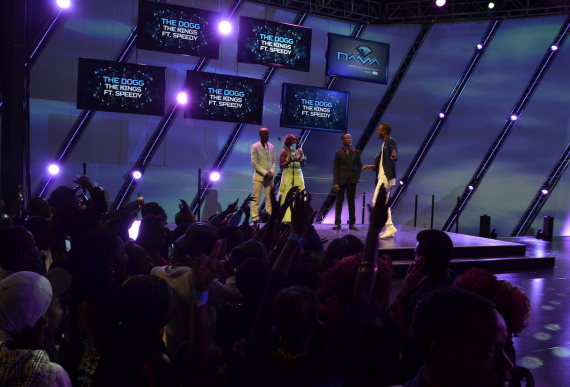The hip-hop monster has spread its tentacles all around the world and the African continent is ready to explode with talent. Many African countries now have their own big annual music awards and Namibia is one of the continents leading nations for about-to-blow rap and R&B artists as well as local stars.
The 6th Namibian Annual Music Awards (NAMA”s) took place this past fortnight in Namibia’s capital city Windhoek at the Ramatex Arena. Put on by the incredible Rockstar4000 publishing and production team with their sponsors NBC and MTC, the staging at the NAMA’s, blue carpet pre-show, and digital streaming across the African continent to 400 MILLION VIEWERS and shows Africa is in many ways ahead of the entertainment game.
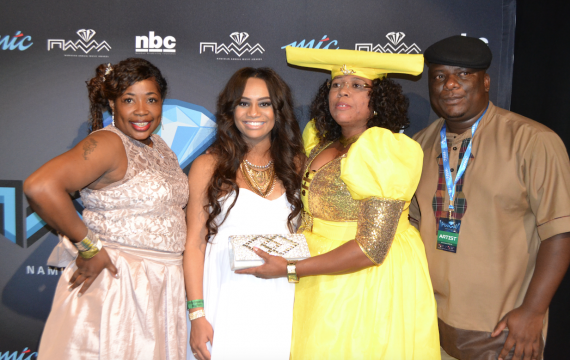
THE NAMA BLUE CARPET.
Namibia is a country in the south west of the African continent next to South Africa and a dream location for safari, nature, wildlife, majestic filmic landscapes (that Star Wars shoots have happened in)….but its also much more than that.
It’s a country with an array of immense music talent, and its young hip-hop inspired artists who have grownup on a diet of American rap, are now representing their culture via hip-hop pizzazz with a truly unique Namibian twist. The Namibian annual music awards exist to recognise accomplishments in the Namibian recording industry by celebrating those groups and individuals who have excelled in the past year and boy do they excel!
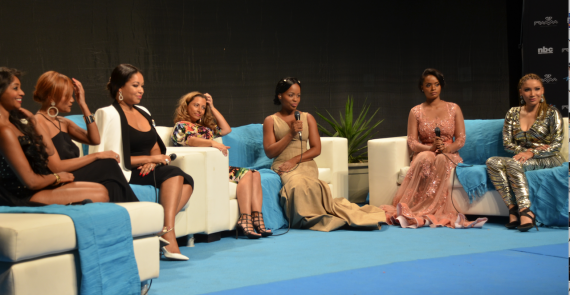
JASMINE ON THE BLUE CARPET FASHION PANEL PRE NAMA SHOW!
I’ve been attending for the past three years as an international judge and award presenter and as ever, the sheer world-class standard of both the show and performers blew me away. With a huge stage, striking set, incredible graphics and lighting as well as huge screens and camera cranes, this was one expensive, well-organized event, and one that surpassed expectations. I’ve been to many award shows around Africa and I have never seen one being delivered like this years’ NAMA’s.
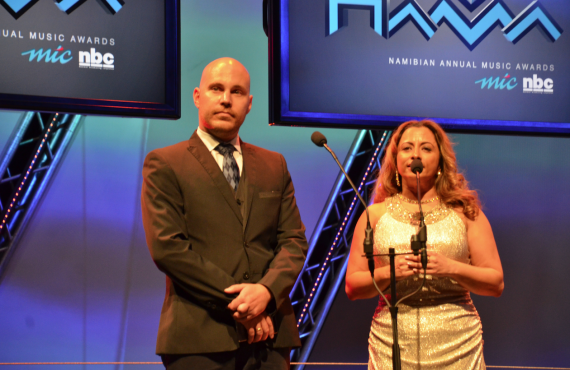
JASMINE CO PRESENTING THE BEST ALBUM AWARD AT THE 2016 NAMA AWARDS.
With an industry awards on the Friday night to recognize DJ’s, pluggers, journalists and more, and the main event happening on Saturday night, both nights of the ‘blue carpet’ event were televised live on Namibian TV on main broadcast sponsor NBC who had a buzzing red carpet crew, which streamed online throughout.
Hundreds of music lovers both local and regional flew in for the NAMAs. It was also attended by Ministers and political leaders, who spoke about how proud they were that Namibian music was starting to get a wider regional recognition around the continent.
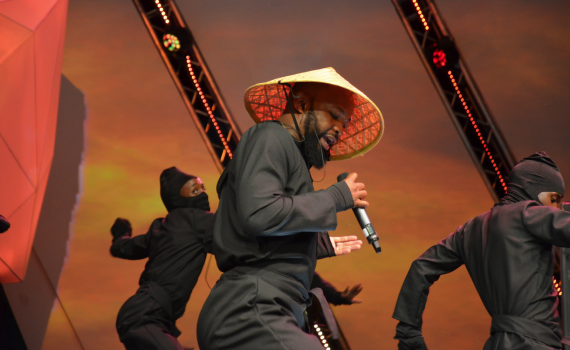
Many of the songs were sung in local dialect, which made the show feel authentic, and kept their heritage, culture and traditional elements strong. The costumes, language and fashion showed no compromise to western pressure and customs.
The infectious beats pumping out of Africa in 2016 are something that the world cannot ignore. A sound so popular and specifically African conjures up the term Afrobeats. The Afrobeats genre is getting steady airplay in the UK, and with acts like Beyonce and more including African nods within their art, its only a matter of time before African names are as household as the rest.
Way back in 2014 we were seeing more Western superstars seeking out African talent and wanting to become a part of this addictive music phenomenon. This movement was internationally recognised when Kanye West signed Nigerian acts Dbanj and Don Jazzy to his G.O.O.D music label in 2011. Big brand names like BET and MTV include international African music categories in their awards too, so we should really sit up and take notice.
Just look at a few of the names you know who are collaborating with African acts;
Fuse and Sean Paul:https://www.youtube.com/watch?v=rfCa82j0h_E –
Dbanj and Kanye West:https://www.youtube.com/watch?v=nuyxLYeoVqk –
P Square and Rick Ross:https://www.youtube.com/watch?v=lY2H2ZP56K4 –
Timaya ft Sean Paul:https://www.youtube.com/watch?v=V4tWUJKiT1MNigeria/Jamaica link up.
The Executive Chairman of the Namibian Annual Music Awards Tim Ekandjo told me “Namibia is rich with musical talent and the Namibian Annual Music Awards has become the medium to once a year provide a world class platform for the amazing Namibian talent across genres to come together on and to shine and showcase the best in music entertainment from Namibia to audiences across the world. NAMA provides Namibian artists not only with a world class stage but also as a window wrapped in world class production to showcase and bring their music alive in the best way possible to TV and digital media audience from all corners of the continent and the rest of the world, providing these artists with a platform that can take them as far as their music can take them. We are incredibly proud of our artists and the time has now come for them to travel to the far corners of the globe, as far as their music can take them, through NAMA as a catalyst and window to opportunity.”
So lets not sleep on this talent. You’ll blink one day soon and they’ll be taking over our parties, charts and hearts. Check out this years NAMA winners below and hear what they have to say about whether you can
rap in any of Namibia’s 11 plus languages and still be relevant to all your listeners? Why they feel zealously protective of their heritage and how much can they rely on American hip-hop before losing their own identity.
Quick ‘’get to know Namibia’s top music acts’ / winners 2016 ;
1-Gazza — ‘Radio Song of the Year’
2-The Dogg — ‘Song of the Year’, ‘Best House’, ‘Best Kwaito’
3-Chikune — ‘Best Female Artist of the Year’
4-Ann Singer — ‘Best Newcomer of the Year’, ‘Best Album of the Year’, ‘Best Afro Pop inclusive of Township Disco’, ‘Best R&B’
5-N.I.A. — ‘Best Gospel’, ‘Best Rap / Hip-Hop’
6-LMPC — Nominated for ‘Best Male Artist of the Year’, ‘Best Newcomer’, ‘Best R&B’
7-Big Ben — ‘Best Traditional’, ‘Best Male Artist of the Year’
8-HILIFA94- ‘Nominee for Best Rap Hip-Hop’
=======================================
GAZZA
========================================
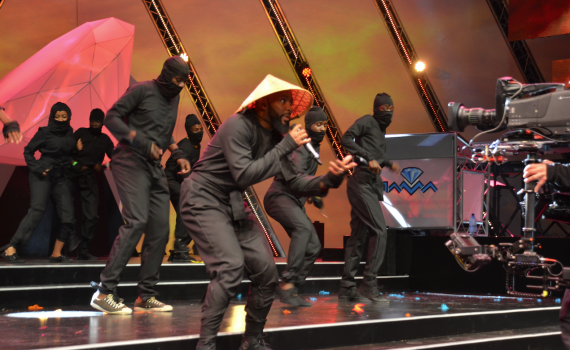
GAZZA PERFORMS AT THE 2016 NAMA AWARDS.
Tell us your name and describe the kind of music you make.
My name is Gazza and my music is a fusion between afro-house, dancehall, hip-hop and kwaito.
How do you represent Hip-Hop culture and its sounds in a Namibian way?
I feel I represent Namibia hip-hop culture cos I spit bars and as long as you spit more that 16 bars that becomes hip hop (lol), and in my own way I’ve created my own style and that’s how I represent my culture and my upbringing that is Namibian hip hop.
How important is it for you to keep your Namibian/African heritage strong within your music?
My African heritage and Namibian heritage is everything that makes my music and me real. Its important – especially within the hip-hop culture – to stay real and authentic and then build a following and so our African heritage is what makes us niche and unique and that’s why its important that we stick to it.
What does the world need to know about Namibian musicians and culture/ who are your other favorite African music acts that we should be aware of and check out?
Namibia is a very unique place with unique talents, it’s a small country but I believe that the talent that we produce in Namibia I believe is big enough to conquer the world so you better watch out.
My other favourite African artists are Davido and Whizzkid- these guys believe and have the passion of music in them strongly, and they have been pushing over the years and they strongly believe in putting their countries on the map so they inspire me a lot.
The world is a global village now and we all draw inspiration from each other, so you now are finding that American artists are coming back to their roots of African rhythms. Also, obviously hip-hop is a global movement and the culture and movement comes with certain responsibilities and claims of territories, so yes, in a way, we as African artists feel like we have to strike a balance between staying African but also being relevant to an international audience to consume your product, so it’s a tricky balance. People do complain if you sound too American and sometimes the local markets don’t really consume your product. So you have to strike a balance for local and international markets, this is why we sometimes mix our languages to have 50% local vernacular and 50% English.
=========================================
THE DOGG:
=========================================
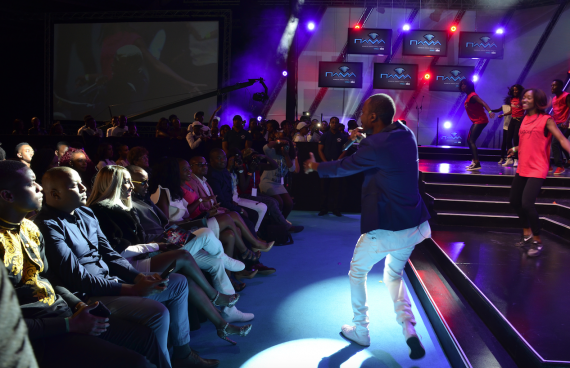
THE DOGG PERFORMS AT NAMA 2016.
• Tell us your name and describe the kind of music you make.
• The DOGG and I do kwaito
• How do you represent Hip-Hop culture and its sounds in a Namibian way?
• I represent Namibian hip-hop culture because it is unique and what I make is a brand New sound.
• How important is it for you to keep your Namibian/African heritage strong within your music?
• It is important because it identifies who we are and by do so it keeps the culture alive for the young generation who should know where we came from.
• What are your earlier memories of falling in love with the art of Music? International memories? Which artists and events are strongest in your mind?
• It was in 97 when I moved to Windhoek from the village, I got introduced to Tupac’s music and his message was real.
• What does the world need to know about Namibian musicians and culture/ who are your other favorite African music acts that we should be aware of and check out?
• Namibian musicians are talented and have something fresh to offer the world. My favourite that you should check out In Africa Is Willis and in Namibia it is Young-T.
=========================================
CHIKUNE:
=========================================
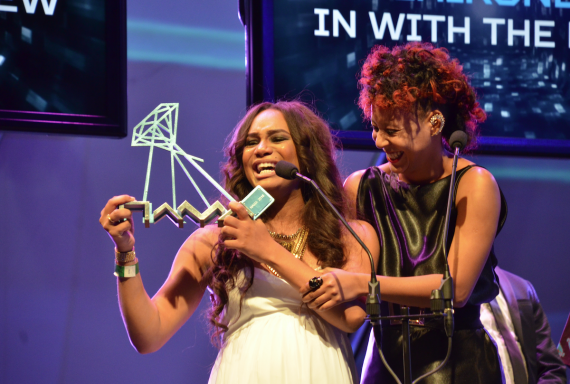
CHIKUNE ACCEPTS HER 2016 NAMA AWARD.
Tell us your name and describe the kind of music you make.
My name is Colleen Hedwig Leitner. My Stage Name is Chikune. My music is a fusion of Urban, Pop and R&B.
• How do you represent Hip-Hop culture and its sounds in a Namibian way?
• I represent Namibian hip hop culture because, as a culture of self-expression and in another context a lifestyle that requires serious talent, I have managed to embody the very essence it so deserves, my music is for the masses and like the efforts of the original hip hop movement it breaks the barriers of social class in my era. RnB has also shaped my art greatly inspired by Mary J Blige. This very same culture provides for the likes of me, the under represented an outlet and possible exposure globally.
• How important is it for you to keep your Namibian/African heritage strong within your music?
• No music is understood or accepted by society without thorough acknowledgement or understanding of its heritage. Keeping my African heritage strong within my music makes my music real and honest, it is an aspect that defines who I am and if withheld is dishonest to myself and to the rest of the world. My home country forms the basis of my fans. Their support is pivotal to my growth. I will be their ambassador out there in the world so to speak and I want to make them proud.
• What are your earlier memories of falling in love with the art of Music? International memories? Which artists and events are strongest in your mind?
• I grew up with peers who shared similar musical fads and we would meet up to compare lyrics we had jotted from songs we all loved and listened to over and over. Memorably are punishments my parents would direct at me. According to them I was messing the walls in my room from pasting up hip-hop memorabilia on my walls that I would cut up from magazines. Little did they know that I had a date with destiny and a future in music (lol)! Artist that have left an historical impression are the likes of Tupac Shakur, MC Lyte, Mary J Blige and Eminem. An event that will remain etched in my mind is the Tupac Shakur-Notorious B.I.G rivalry and feud, which led to the deaths of two very powerful musical icons.
• What does the world need to know about Namibian musicians and culture/ who are your other favorite African music acts that we should be aware of and check out?
• Namibian musicians embrace their strong cultural values and use their music and artistry as a conduit to express the same and as a tool of communication. I can also say that the musical talents in Namibia can be equaled to many acts across our borders. We have an immeasurable collection of talent. Locally I immensely appreciate Ann Singer and Gazza.
==========================================
ANN SINGER:
=========================================
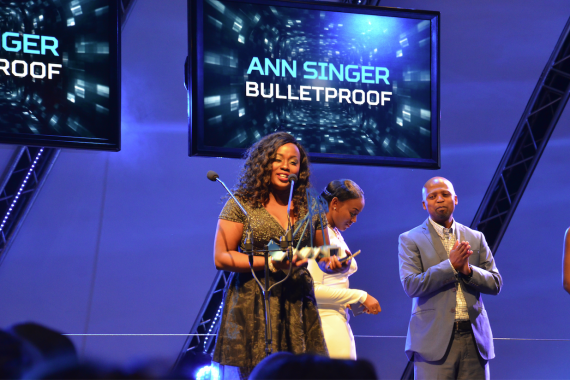
ANN SINGER ACCEPTS HER AWARD AT THE 2016 NAMA’S
Tell us your name and describe the kind of music you make?
My name is Ann Singer and I do Afro Pop, R&b and a little bit of jazz
• How do you represent Hip-Hop culture and its sounds in a Namibian way?
• “I represent Namibian hip hop culture because I try to make music that Namibian people understand and relate to with a beautiful Namibian feel….”
• How important is it for you to keep your Namibian/African heritage strong within your music?
• It is very important to me because I want the Namibian music feel that has been created to stay alive and for the people to adapt to it.
• Is there ever a tension between staying authentically African or more American?
• There is always a lot of tension because when you try to make music that sounds too American people feel you are trying too hard and you are not original enough.
• What are your earlier memories of falling in love with the art of Hip-Hop?
• Growing up I listened to a lot of music on radio. The likes of 2pac and the likes of Backstreet Boys and Westlife
• What does the world need to know about Namibian musicians and culture/ who are your other favorite African music acts that we should be aware of and check out?
• The Namibian music scene is growing at a very fast pace with a lot of very talented musicians and entertainers. My favorite African act will have to be Mtukuzi from Zimbabwe and I think the world should really check him out.
=========================================
N.I.A.:
=========================================
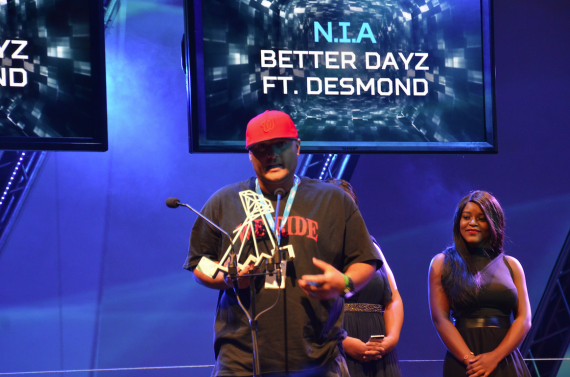
N.I.A ACCEPTS HIS 2016 NAMA AWARD.
Tell us your name and describe the kind of music you make?
• My name is N.I.A it stands for nonchalant in action basically meaning cool under pressure, not too much fazes me. I make socially conscience music that touches on our everyday struggles and relays a strong message of hope
•
• How do you represent Hip-Hop culture and its sounds in a Namibian way?
• I represent Namibian hip hop by having very unique Namibian sounds or any instruments that are commonly use in our local music added to our beats plus I also use hip hop to tackle issues which are effecting our nation.
•
• How important is it for you to keep your Namibian/African heritage strong within your music?
• It is very important for me to keep my Namibian/African heritage strong in my music because I represent Namibia, I represent Africa, I want the world to notice our unique sounds, cultures and to enjoy our amazing talents.
•
• Is there ever a tension between staying authentically African or more American?
• I don’t believe that there is a tension, I believe hip-hop is universal the culture, the music and the movement. Once u have the love for it, it’s relatable in any language or culture.
•
• What are your earlier memories of falling in love with the art of Hip-Hop?
• My earliest memories are listening to Tupac albums (Thug Life, Tupacalipse and Me against the World); these albums completely changed the way I listened to music and gave me the undying love I have for hip hop music. I saw the power and influence hip-hop has if used in the way it was intended which is to spread positive messages and give hope.
•
• What does the world need to know about Namibian musicians and culture/ who are your other favorite African music acts that we should be aware of and check out?
• Namibian musicians work very hard and have a passion that’s unmatched for music; music is a very big part of our cultures. We have so many genres of music, which completely influence each other. We study music and understand the history of music…. Artist I think you should look out for are DESMOND and CHIKUNE
=========================================
LMPC:
=========================================
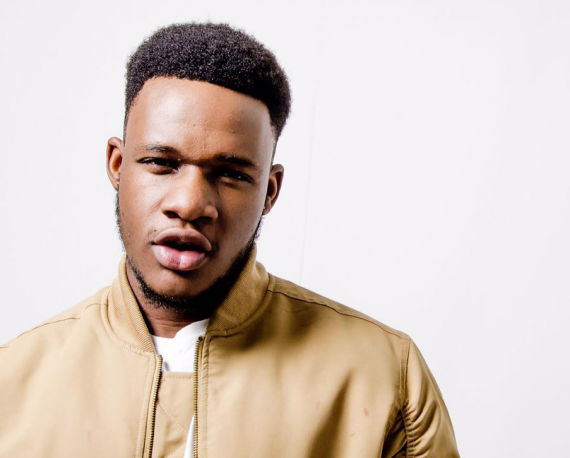
LMPC.
Tell us your name and describe the kind of music you make?
My name is LMPC. The music I make is a blend of Rap, RnB and Afro-pop. Sometimes I make songs that include all 3 genres and other time I make songs with these genres respectively. It’s a new sound, it’s my sound.
• How do you represent Hip-Hop culture and its sounds in a Namibian way?
• I represent Namibian Hip Hop culture because the content in my music is based on my experiences as a Namibian and a Namibian artist. Also I’m bringing a new style of Hip Hop, a more emotional and personal one. A new wave of hip hop culture to represent in Namibia.
•
• How important is it for you to keep your Namibian/African heritage strong within your music?
• Very important, but it’s hard. I’ve somewhat lost my Namibian heritage and I need to bring it back. But first I need to find and embrace it in my personal life and then it will reflect in my music, so that I have a more informed perspective and way of presenting it to the world.
•
• Is there ever a tension between staying authentically African or more American?
• Not really, I’ve created this balance between the two. I have these alter egos in my music. For example, “Brownskincoco”. Brownskincoco is the African voice in my music that uses African tones and accents when singing and rapping. Whereas LMPC is more American with African content, like instead of saying the N-word, I would say jita(s), which means guy(s).
•
• What are your earlier memories of falling in love with the art of Hip-Hop?
• For me it was Tupac, my dad would play his music when I was younger and what really got my attention was how he was a gangster rapper but he still showed so much emotion. That’s the main reason I started rapping, to talk about my feelings because there was no one to listen to them, and through music there was/is more people to listen to my feelings.
•
• What does the world need to know about Namibian musicians and culture/ who are your other favorite African music acts that we should be aware of and check out?
• The world needs to know that we are coming. Coming to tell our stories, we’re coming to showcase all the hidden talent that we have. My other favorite African acts are Kalux, Jaleel and Stxzo to name a few.
=========================================
BIG BEN:
=========================================
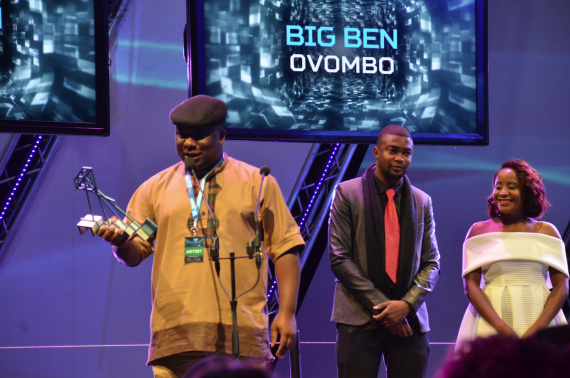
BIG BEN ACCEPTS HS 2016 NAMA AWARD.
Tell us your name and describe the kind of music you make.
Big Ben was born Venaune Ben Kandukira. His music is a blend of ethnic rhythms and melodies fused with popular sounds from the rest of the African continent and the world. He draws not just inspiration but makes an effort to directly interpret traditional music of various Namibia tribal sounds to create a unique Namibian form of Afro-Fusion and Afro-Pop.
• How do you represent Hip-Hop culture and its sounds in a Namibian way?
• I represent Namibian urban culture because I integrate urban popular music with tribal chants, forms of praise singing and uses local languages to provide the world with a unique blend that stays true to a Namibian identity while blending in with urban popular trends.
•
• How important is it for you to keep your Namibian/African heritage strong within your music?
• Every other sound in the world right now has been done and recycled already. As an African musician I believe that our ethnic rhythms and poetry is the only forms of music that has not fully been explored yet and would therefore be the freshest sound for the world. Music is a language used to communicate a people’s ideas, fears and aspirations and therefore only your own original sound can transmit those ideas accurately. I do not believe anybody would respect what you do if you have no clear identity to present.
•
• Is there ever a tension between staying authentically African or more American?
• There is no tension between African and American musical culture. It is clearly evident that both cultures borrow from each other and this fusion has produced some of the most successful music in history. What we are experiencing is distance and space, and event that is slowly disappearing as musicians try to breakdown artificial borders to join in one song. What looks like tension is an energy pushing and fusing all cultures into one to eventually create a harmony.
•
• What are your earlier memories of falling in love with the art of Music? International memories? Which artists and events are strongest in your mind?
• My generation grew up in a lucky world of music from all corners of the world on radio, television and now the Internet. I grew up the music of African singers such as the Kutis in Nigeria, Salif Keita, Stimela, Bob Marley, Ray Charles, Jackson Kauyeua, Johny Clegg, James Brown, Cesária Évora and many more. Even at that point it was clear that music was a tool to transmit ideas for a loving and caring society. I remember music being used to plead for peace, for the independence of nations from other cruel nations, for a crime free society and for the rights of those robbed of the most basic needs. I remember music as the language of the gods.
•
• What does the world need to know about Namibian musicians and culture/ who are your other favorite African music acts that we should be aware of and check out?
• Namibia might be only known to be a scenic paradise and the last animal kingdom but it is also the last frontier in musical and cultural expressions. With over 11 tribes with strongly diverse musical expressions it certainly should draw the eye for any musician looking for an injection of fresh ideas. Namibian musicians strongly emphasize their own rhythms and language and this presents the world with a unique type of entertainment. Without much help, they have gone on to compete and collaborate with musicians from the African, Europe the Americas and the Caribbean Islands.
•
• Namibian stars such Erna Chimu, Gazza, Elemotho, The Dogg, Ras Sheehama, Big Ben and many more have graced international events and have gotten accolades where ever they appeared. Look deeper and you will realize that many stars are already invading airwaves across Africa and the world such as JBlack, Ann Singer, Chikune, Exit, Paradox, KK, Desmond and many others are just ready to shine when the window opens. They are hard working people who simply need an opportunity to show what they have to offer.
=========================================
HILIFA94: — Nominee for Best Rap Hip-Hop
=========================================
• Tell us your name and describe the kind of music you make.
• The name is Hilifa 94, born Hilifa-Vali Lisias Uusiku on 9 Jan, 1994. I make hip hop/rap and conscious trap.
•
• How do you represent Hip-Hop culture and its sounds in a Namibian way?
• I represent Namibian Hip hop culture because I’m a son of the soil and I rap about topics that the average modern African person can relate to. When I rap, I reflect a picture of freedom, which is the base on which our fore fathers built this country.
•
• How important is it for you to keep your Namibian/African heritage strong within your music?
• It is very important as it keeps me close to my identity. However, sometimes it is also important to adopt a variety of universal sounds in order to give your sound a diverse personality, this will also help to broaden your audience.
•
• Is there ever a tension between staying authentically African or more American?
• The tension is definitely there. But personally, my influence has always been from America hip-hop. My music has always been a reflection of my everyday life, the way i grew up, what I observed growing up, the sounds I grew up to and the character’s that inspired me to start rapping. Even thou I incorporate African sounds and slang in some of My songs, My music will always have a more American influence because that was the sound that molded me into Hilifa94.
•
• What are your earlier memories of falling in love with the art of Music? International memories? Which artists and events are strongest in your mind?
• I started listening to Hip hop in an era where the original boom-bap sound together with that gangster feel was still relevant. I remember bumping my older brothers’ hip hop album collection, with albums such as Tupacs’ All eyes on me, Dr Dre’s Chronic 2000, D12’s Devils night and Eminem’s Marshal Mathers Lp, I just fell in love with Hip hop. The beats were crazy and the style was just fresh.
•
• What does the world need to know about Namibian musicians and culture/ who are your other favorite African music acts that we should be aware of and check out?
• Namibian music has so much potential; our musicians are diamonds in the rough. There is so much raw talents that need to be refined. Sometimes I feel like most of the world is still sleeping on Namibian music because we haven’t really proved ourselves on an international level yet. But I feel like we have reached a point where we are ready to take on the international scene and it’s only a matter of time before we finally blow up. My favourite African musicians that I think the world should watch out for are Aka, Gazza, Nasty-C and Patoranking, These musicians have the Juice.
================
-END
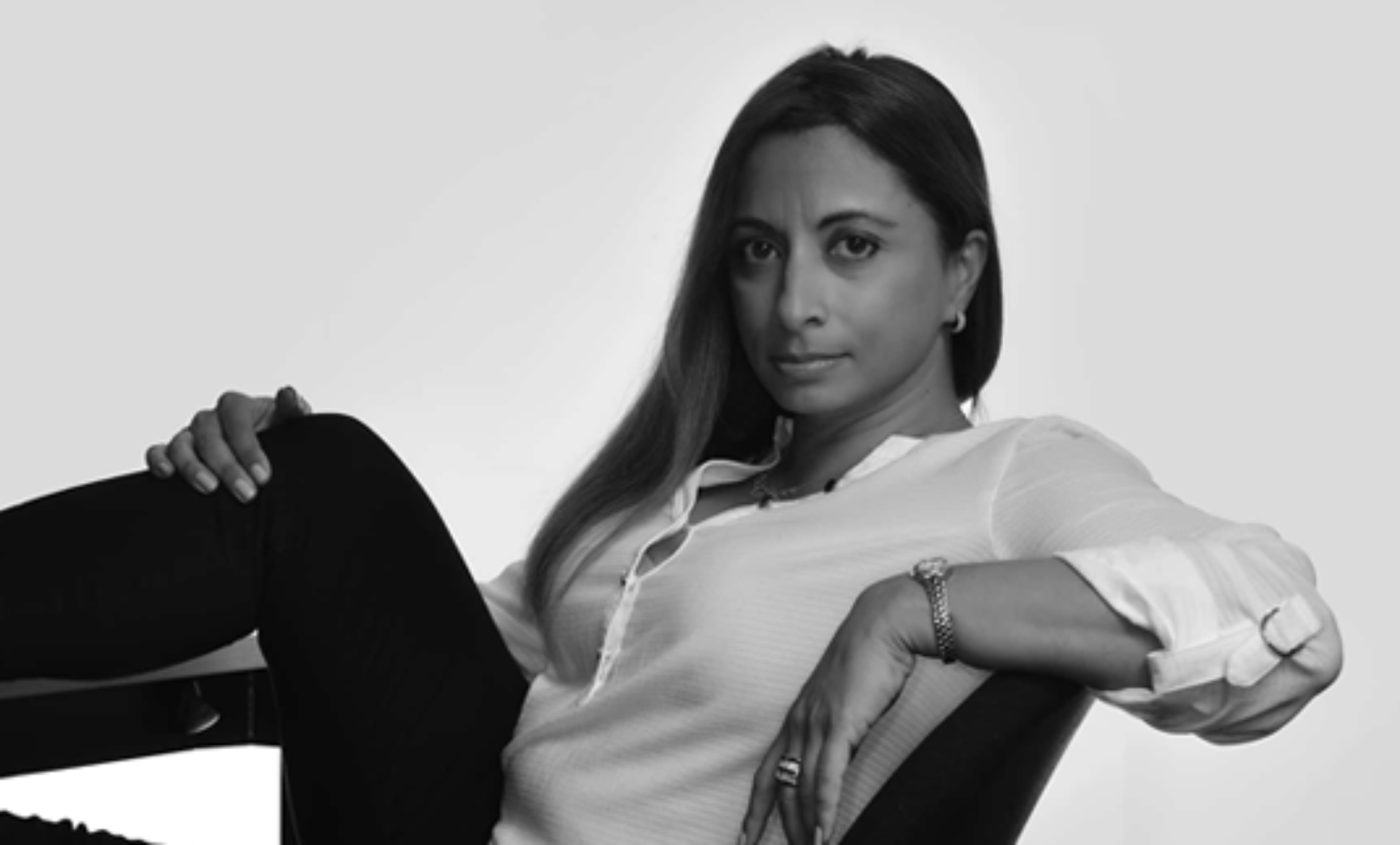
 Follow
Follow